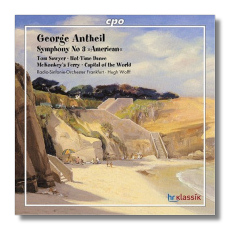
The Internet's Premier Classical Music Source
Related Links
- Antheil Reviews
- Latest Reviews
- More Reviews
-
By Composer
-
Collections
DVD & Blu-ray
Books
Concert Reviews
Articles/Interviews
Software
Audio
Search Amazon
Recommended Links
Site News
 CD Review
CD Review
George Antheil

Orchestral Works
- Symphony #3 "American"
- Tom Sawyer
- Hot-Time Dance
- McKonkey's Ferry
- Capital of the World: Suite
Frankfurt Radio Symphony Orchestra/Hugh Wolff
CPO 777040-2 DDD 61:28
Possibly the most entertaining composer autobiography is George Antheil's Bad Boy of Music. (No modesty there!) Antheil's music is no less entertaining. He is the sort of character who could exist only in America. At different points in his life he was an endocrinologist, a lonely hearts columnist, and the inventor (with actress Hedy Lamarr!) of a radio-controlled torpedo.
This is the third Antheil release from Wolff and Radio Symphony Frankfurt – the orchestra of Hessian Radio. [Earlier releases were devoted to the First and Sixth Symphonies (CPO 999604-2) and the Fourth and Fifth (CPO 999706-2).] This one, recorded in 2001, is no less mirth-inducing. The "American" Symphony was composed in the late 1930s (and revised in 1946), and it was at partly inspired by the Antheil's automobile trip across America. (The third movement is subtitled "The Golden Spike" – a reference to the completion of railroad tracks across the continent, and the last movement is called "Back to Baltimore." This is odd, because in 1936, the Antheils made their home not in Baltimore, but in New York City!) Antheil seems not to have been completely satisfied with this work, if only because he didn't think the four attractive but ultimately free-standing movements quite added up to a symphony.
In the "American" Symphony, as well as in the other five works on this CD (all written between 1948 and 1953), Antheil's brilliantly outrageous music is almost consistently at its best. Antheil's "style" might best be described as the fanciful union of Prokofieff with Copland, with foreshadowings of Leonard Bernstein at his most populist. Tom Sawyer (inexplicably subtitled "California Overture"!) is kitchen-sink Americana, and the Hot-Time Dance (apparently all that came to fruition of a proposed American Dance Suite) might also be titled "Yankee Doodle Khachaturian." McKonkey's Ferry depicts Washington and his troops crossing the Delaware River near Trenton, but it might just as well have portrayed Alexander Nevsky routing Goths on the surface of a frozen lake, had Prokofieff not gotten there first! It's more than a little vulgar, but great fun nonetheless.
Antheil was commissioned to write Capital of the World in 1952. Based on a story by Hemingway, the ballet is about Paco, a would-be bullfighter who comes to Madrid for fame and glory, but who finds only disillusionment and death. The 17-minute suite presented here is not as comprehensive as the 26 minutes of music recorded by Joseph Levine and the Ballet Theater Orchestra for Capitol Classics in 1954. Furthermore, Levine's reading includes the actual sound of dancer Roy Fitzell's feet! That is omitted here, but Wolff's reading eclipses Levine's in every other way.
These performances are polished and bursting with energy. If the Hessian musicians feel embarrassed by a single note of Antheil's music, they don't reveal it, and Wolff, as always, is a dynamo. Furthermore, cpo's engineering is top of the line, as we expect it to be. Finally, Eckhardt van den Hoogen's lengthy but never verbose booklet notes are a pleasure to read, bubbling over as they are with the brashness and sarcasm one finds everywhere in Antheil's music.
Copyright © 2005, Raymond Tuttle



















